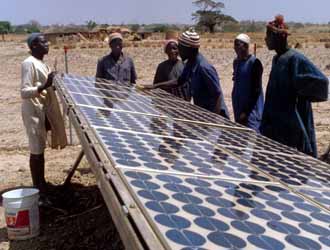Participants at a side-event at the recently held UN climate change talks (COP22) in Marrakech, Morocco have described the Africa Renewable Energy Initiative (AREI) as a project initiated by Africans for Africans in an effort to accelerate and scale up the harnessing of the continent’s huge renewable energy potential.

A representative of Dr. Youba Sokona, Head of AREI Independent Delivery Unit at the African Development Bank (AfDB), made the submission on Sunday, November 13 2016, during the AMCEN Meeting of African Ministers of Environment at the global climate summit.
“It is not just an initiative; it is a transformational initiative. The AREI is very transformational in the sense that it is an initiative by Africans for Africans to help develop and unlock the renewable energy potentials of the continent,” he submitted.
According to him, besides hosting the Independent Delivery Unit of AREI, the AfDB also functions as a Trustee for the initiative. He added that the African Union Commission (AUC) is the convening body, working with all the key institutions in order to implement the decisions of the AU.
Launched at a Session during the High-Level Meeting on “Lima-Paris Action Agenda: Focus on Energy” on 07 December, 2015 at the COP21 in Paris, AREI aims to add an additional 10 GW and 300 GW of renewable energy capacity to the African energy sector by 2020 and 2030, respectively, and is endorsed and supported by the Governments of France, Germany, U.S., and Canada.
The initiative is expected to have a considerable impact on the reduction of greenhouse gases emissions in the continent. At least $5 billion in public and highly concessional finance between 2016 and 2020, from bilateral, multilateral and other sources, including the Green Climate Fund, will be needed to leverage a further $15 billion in other investments, for a total investment of at least $20 billion pre-2020, it was gathered.
Apart from the AfDB and the AUC, the New Partnership for Africa’s Development (NEPAD) Agency, the African Group of Negotiators, United Nations Environment Programme (UNEP), and the International Renewable Energy Agency (IRENA) are also involved in AREI.
However, the composition of the board of AREI as well as the involvement of AMCEN dominated discussions among the delegates, who were likewise briefed about the Africa Adaptation Initiative (AAI).
“There was a decision on the matter. An assembly took a decision on the structure of the AREI. AMCEN will appreciate that the AMCEN president will circulate a draft reference from the AREI. Where will we place the role of the AMCEN chair?” demanded Dr Edna Molewa, Environment Minister of South Africa.
“It will be very important that we do what the President of AMCEN has said that we should speak with one voice as Africa, together. Based on the decisions of our heads of state, the AREI has been developed and is now operational. So I would like to reiterate that call that we all stand behind that initiative,” said Dr Sokona.
AMCEN president and Minister of Environment of Egypt, Dr. Khaled Fahmy, said: “Representation and composition, based on the decisions of the heads of state in July; that is the intention. At the moment, who is sitting on the board has not been decided, that is the decision of the heads of state, and that representation will make sure that Africa is fully represented. I’m sure that is one of the things they will be considering. I don’t think it’s a proper time now to go into details as to what happens and what exactly will be the composition.”
Building rapidly on the warm reception given to the AREI, the African Group of Negotiators (AGN) developed the African Adaptation Initiative (AAI), with the objective of ensuring that African countries lead the work in adaptation and loss and damage on the continent.
The AAI is intended to scale up adaptation in Africa, through enhancing pre-2020 ambition on adaptation and addressing loss and damage in its initial phase, and providing a platform to enhance medium and long term actions. Its work programme includes mapping of existing and future adaptation programmes, supporting countries in undertaking needs assessments, facilitating access to resources, and coordinating and facilitating regional and national efforts to assess and address loss and damage.
The initiative has four thematic pillars for which specific objectives and quantifiable targets have been set:
- enhancing observational infrastructure and early warning systems;
- supporting the creation and strengthening of national institutions and policies;
- enabling the implementation of specific projects and actions; and,
- mobilising finance and investments.
